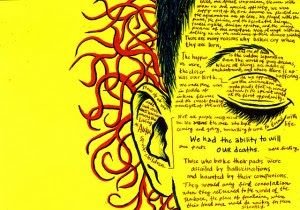Grade 12 English Unit 7: Humour (with Grammar Solutions)- Language Development
Reading
Why Do We Laugh Inappropriately?
Science Focus
Working with words
A. The following words are synonyms and antonyms of the verb ‘laugh’. Group them into synonyms and antonyms.
Synonyms
chuckle
giggle
chortle
crackle
snicker
groan
smirk
whoop
Antonyms
grin
sob
grimace
frown
pout
scowl
cry
moan
B. Match the following emotions with their definitions.
a. fear i. a feeling of strong disapproval aroused by something unpleasant
b. anger ii. affected with grief or unhappiness
c. surprise iii. a pleasurable or satisfying experience
d. disgust iv. a great victory or achievement
e. sadness v. a strong feeling of displeasure
f. happiness vi. an unpleasant emotion caused by the threat of danger, pain or harm
g. relief vii. the quality or state of being satisfied
h. triumph viii. removal or lightening of something oppressive, painful, or distressing
i. contentment ix. an unexpected event, fact, etc.
C. The author writes, “. . . the contagious nature of laughter means that waves of mirth can catch on more easily when there are more people.” Find out the situations in which the following types of laughter are found.
a. etiquette (good manner) laughter
At the end of a long day, you find yourself in the elevator with your boss. Instead of talking up your latest accomplishments, though, you find yourself laughing at everything he says.
And if you're trying to ascend the corporate ladder, you're not the only one laughing at the boss. We tend to laugh with anyone who can help us out, which is why a group of undergraduate students may guffaw at a professor's bad joke, while a job applicant's attempts at humor may fall flat with those who are already gainfully employed.
b. snorting laughter
When you aren't actively trying to practice the art of silent laughter, odds are some kind of sound will occur when something strikes your funny bone. Most laughter is, after all, a string of vocal ha-has or ho-hos.
But what if you're one of the roughly 25 percent of women or 33 percent of men who laugh through the nose? Then you'd be a snorter
c. stress-relieving laughter
d. silent laughter
Those of us who work in cubicles may think that silent laughter is a skill we've perfected so that we can look at funny Web sites and videos at work. Mindfully practicing silent laughter, though, can have real benefits because it involves the same type of deep breathing that comes with belly laughter.
e. nervous laughter
There are times when we need to project dignity and control, like during presentations to the CEO or during a funeral. Unfortunately, these are the times when uncontrollable nervous laughter is likely to strike.
During times of anxiety, we often laugh in a subconscious attempt to reduce stress and calm down. However, nervous laughter usually just heightens the awkwardness of the situation.
f. cruel laughter
That probably hasn't always stopped you, either. Let's face it: Whether you were a bully in school or the kid getting picked on, you've found yourself breaking this rule at some point.
D. A unit of pronunciation at least with one vowel is called a syllable. Listen to your teacher saying the words and say the number of syllables.
charge 1
duty 2
laughter 2
commission 3
undertaking 4
responsibility 6
hilarity 4
persistent 3
infectious 3
ephemeral 4
Comprehension 4
A. Complete the following sentences with words/ phrases from the text.
a. According to Sophie Scott, laughter is one of the important and misunderstood………..
b. After her study in Namibia, Scott came to the realization that…………….
c. Studies have shown that there are …………..based on facial expressions.
d. Scott found out that most of the laughs have nothing …………….
e. The couples who laugh at each other are likely to ………………
f. The primary way of communication of grown up people is …………… .
g. Comedians usually find it easier to work in larger places due to .............. .
Grammar
Adverbs
A. Study the following sentences from the text. The words in bold are called 'frequency adverbs'.
a. Belly laughs never come through the nose.
b. There is always a meaning to it.
c. She found that the less authentic tones are often more nasal.
d. Scott occasionally takes up the microphone herself at comedy nights in London.
e. She tells me about an acquaintance who had frequently irritated her with a persistent, fluting, laugh.
B. Put the frequency adverbs in appropriate places and rewrite the following sentences.
a. I forget to do my homework. (sometimes)
b. My father has touched an alcoholic drink in his life. (never)
c. My father goes for a walk on Saturdays. (often)
d. We go to the movie theatre. (occasionally)
e. My brother is in America. He telephones us. (from time to time)
f. My mother gets up at five o’clock. (always)
g. He does not like alcoholic drinks but takes some wine. (now and then)
h. I drink my tea with milk. (generally)
i. Have you been to Agra? (ever)
j. The restaurant hours vary as it is booked for special events. (frequently)
Correct Form
a. Sometimes I forget to do my homework.
b. My father has never touched an alcoholic drink in his life. ()
c. My father often goes for a walk on Saturdays.
d. We go to the movie theatre occasionally.
e. My brother is in America. He telephones us. (from time to time)
f. My mother always gets up at five o’clock.
g. He does not like alcoholic drinks but takes some wine. (now and then)
h. Generally I drink my tea with milk.
i. Have you ever been to Agra?
j. The restaurant hours vary frequently as it is booked for special events.





Comments
Post a Comment